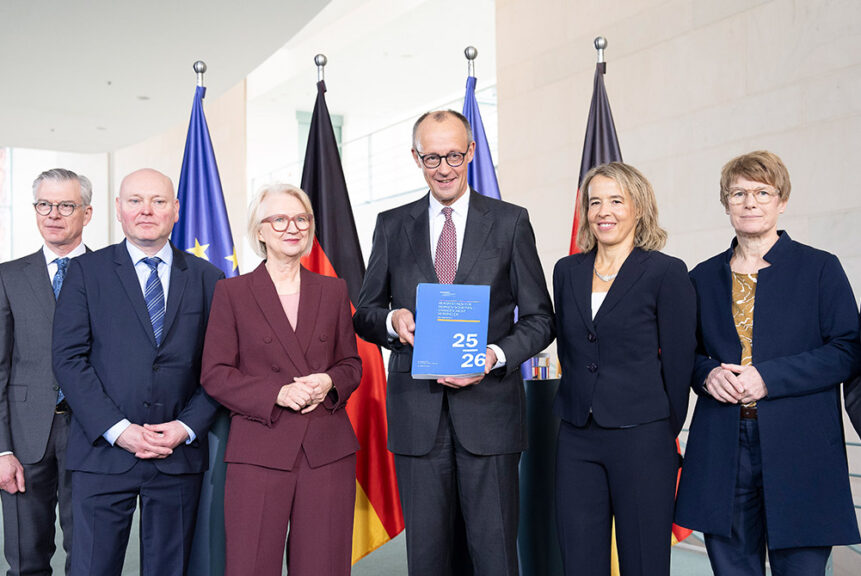The German Council of Economic Experts presented its latest Annual Report to German Chancellor Friedrich Merz on November 12, 2025. Prof. Dr. Veronika Grimm is Professor of Energy Systems and Market Design at the University of Technology Nuremberg and has been a member of the council since 2020. Under the title “Creating prospects for tomorrow – Don’t squander opportunities,” the report addresses Germany’s current economic challenges.
The German economy remains in a difficult phase, even though slight growth is expected again in 2025 for the first time since 2022. Price-adjusted gross domestic product is expected to grow by 0.2 percent. Development continues to be dampened by low investment and weak export demand. Growth of 0.9 percent is then expected in 2026.
In addition to economic developments, the report also addresses currently important areas of economic policy. The Council of Economic Experts sees an urgent need for action, particularly with regard to the special fund for infrastructure and climate neutrality. So far, its impact has been limited, as a significant portion of the funds has been used for reallocations in the federal budget and to finance current expenditures. Instead, the funds should be used for future-oriented additional expenditure.
The Council of Economic Experts also points to the high potential of the European single market that could be unlocked through enhanced integration of the European goods, services, and capital markets. To strengthen defense capabilities, defense equipment in Europe should be procured in a coordinated manner and military innovations should be jointly promoted. In addition, the Council of Economic Experts welcomes the reform of corporate taxation, which reduces the tax burden on investments and thus enables additional, but moderate, growth impulses.
In her minority opinion, UTN professor Veronika Grimm also advocates structural reforms that curb the rise in government spending and trigger dynamic growth, and warns of the risks of rising government debt. She rejects the majority of the Council’s proposal to abolish the exemption of business assets without a significant reduction in tax rates. In the current challenging economic situation, this could further weaken the investment activity of small and medium-sized enterprises and thus unnecessarily dampen economic dynamism.
To the full report (external link)
Press Photos for Download
Press Photo German Council of Economic Experts (Copyright: Bundesregierung – Steffen-Kugler)
Press Photo of Prof. Dr. Veronika Grimm (Copyright: Bundesregierung – Steffen-Kugler)
About the German Council of Economic Experts
The German Council of Economic Experts supports politicians and the public on economic policy issues and topics. It was founded in 1963 as an independent body and consists of the members Prof. Dr. Veronika Grimm, Prof. Dr. mult. Dr. Dr. h.c. Ulrike Malmendier, Prof. Dr. Dr. h.c. Monika Schnitzer (Chairwoman), Prof. Dr. Achim Truger and Prof. Dr. Martin Werding. With its regularly published reports, the Expert Council aims to help the public and decision-makers in politics, business and society to form an informed opinion on economic policy developments in Germany.

The German Council of Economic Experts presented its latest Annual Report to German Chancellor Friedrich Merz on November 12, 2025. Prof. Dr. Veronika Grimm is Professor of Energy Systems and Market Design at the University of Technology Nuremberg and has been a member of the council since 2020. Under the title “Creating prospects for tomorrow – Don’t squander opportunities,” the report addresses Germany’s current economic challenges.
The German economy remains in a difficult phase, even though slight growth is expected again in 2025 for the first time since 2022. Price-adjusted gross domestic product is expected to grow by 0.2 percent. Development continues to be dampened by low investment and weak export demand. Growth of 0.9 percent is then expected in 2026.
In addition to economic developments, the report also addresses currently important areas of economic policy. The Council of Economic Experts sees an urgent need for action, particularly with regard to the special fund for infrastructure and climate neutrality. So far, its impact has been limited, as a significant portion of the funds has been used for reallocations in the federal budget and to finance current expenditures. Instead, the funds should be used for future-oriented additional expenditure.
The Council of Economic Experts also points to the high potential of the European single market that could be unlocked through enhanced integration of the European goods, services, and capital markets. To strengthen defense capabilities, defense equipment in Europe should be procured in a coordinated manner and military innovations should be jointly promoted. In addition, the Council of Economic Experts welcomes the reform of corporate taxation, which reduces the tax burden on investments and thus enables additional, but moderate, growth impulses.
In her minority opinion, UTN professor Veronika Grimm also advocates structural reforms that curb the rise in government spending and trigger dynamic growth, and warns of the risks of rising government debt. She rejects the majority of the Council’s proposal to abolish the exemption of business assets without a significant reduction in tax rates. In the current challenging economic situation, this could further weaken the investment activity of small and medium-sized enterprises and thus unnecessarily dampen economic dynamism.
To the full report (external link)
Press Photos for Download
Press Photo German Council of Economic Experts (Copyright: Bundesregierung – Steffen-Kugler)
Press Photo of Prof. Dr. Veronika Grimm (Copyright: Bundesregierung – Steffen-Kugler)
About the German Council of Economic Experts
The German Council of Economic Experts supports politicians and the public on economic policy issues and topics. It was founded in 1963 as an independent body and consists of the members Prof. Dr. Veronika Grimm, Prof. Dr. mult. Dr. Dr. h.c. Ulrike Malmendier, Prof. Dr. Dr. h.c. Monika Schnitzer (Chairwoman), Prof. Dr. Achim Truger and Prof. Dr. Martin Werding. With its regularly published reports, the Expert Council aims to help the public and decision-makers in politics, business and society to form an informed opinion on economic policy developments in Germany.